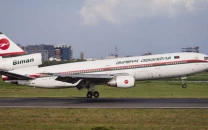US to send more warships, fighters to 'defend Israel'
Iran says Haniyeh killed by short-range projectile

The US military will deploy additional fighter jets and Navy warships to the Middle East, the Pentagon said on Friday, as Washington seeks to bolster defenses following threats from Iran and its allies Hamas and Hezbollah.
Iran's Revolutionary Guards said Saturday that Israel killed Hamas political chief Ismail Haniyeh using a "short-range projectile" launched from outside of his accommodation in Tehran.
"This terrorist operation was carried out by firing a short-range projectile with a warhead of about 7 kilograms - causing a strong explosion - from outside the accommodation area," the Guards said in a statement.
It added that Israel was "supported by the United States" in the attack.
The US is bracing for Iran to make good on its vow to respond to the killing of Hamas leader Ismail Haniyeh two days ago in Tehran - one in a series of killings of senior figures in the Palestinian group as the war between Israel and Hamas in Gaza rages.
US Defense Secretary Lloyd Austin had approved sending additional Navy cruisers and destroyers-- which can shoot down ballistic missiles-- to the Middle East and Europe. It is also sending an additional squadron of fighter jets to the Middle East.
"Austin has ordered adjustments to US military posture designed to improve US force protection, to increase support for the defense of Israel, and to ensure the United States is prepared to respond to various contingencies," the Pentagon said in a statement.
There had been speculation that the Pentagon might not replace the USS Theodore Roosevelt carrier strike group in the Middle East once it completed its ongoing deployment. But Austin decided to rotate in the USS Abraham Lincoln Carrier strike group to replace it.
The Pentagon statement added it would increase readiness to deploy more land-based ballistic missile defenses. The US military also intensified deployments prior to April 13, when Iran launched an attack on Israeli territory with drones and missiles. Still, the threat from Hezbollah in Lebanon could present unique challenges to any efforts by the United States to intercept drones and missiles given the group's vast arsenal and immediate proximity to Israel.
At the time, Israel successfully knocked down almost all of the roughly 300 drones and missiles with the help of the United States and other allies.
Iran and Hamas have both accused Israel of carrying out the killing and have pledged to retaliate against their foe. Israel has not claimed responsibility for the death nor denied it.
Haniyeh's death was one in a series of killings of senior Hamas figures as the war in Gaza between Hamas and Israel nears its 11th month and concern grows that the conflict is spreading across the Middle East.
Meanwhile, the Guards repeated their insistence that Haniyeh would be avenged and that Israel would receive "a severe punishment at the appropriate time, place and manner".
On Saturday, the ultraconservative Kayhan daily said retaliatory operations were expected to be "more diverse, more dispersed and impossible to intercept".
"This time, areas such as Tel Aviv and Haifa and the strategic centres and especially residences of some officials involved in the recent crimes are among the targets," the newspaper said in an opinion piece.



















COMMENTS
Comments are moderated and generally will be posted if they are on-topic and not abusive.
For more information, please see our Comments FAQ